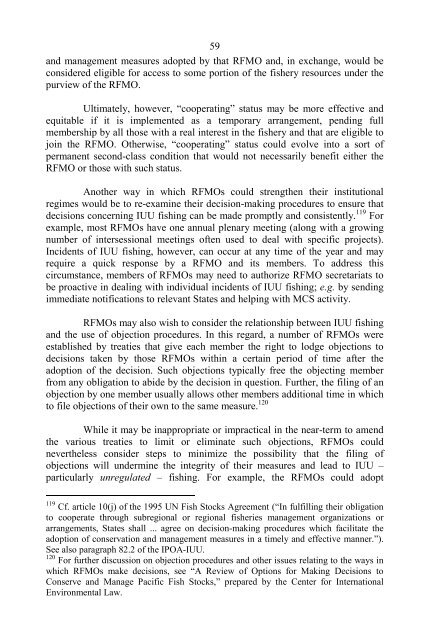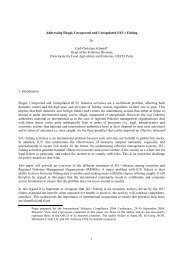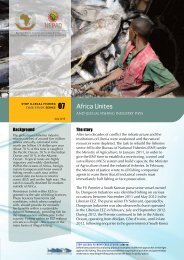Implementation of IPOA/IUU - International MCS Network
Implementation of IPOA/IUU - International MCS Network
Implementation of IPOA/IUU - International MCS Network
You also want an ePaper? Increase the reach of your titles
YUMPU automatically turns print PDFs into web optimized ePapers that Google loves.
59and management measures adopted by that RFMO and, in exchange, would beconsidered eligible for access to some portion <strong>of</strong> the fishery resources under thepurview <strong>of</strong> the RFMO.Ultimately, however, “cooperating” status may be more effective andequitable if it is implemented as a temporary arrangement, pending fullmembership by all those with a real interest in the fishery and that are eligible tojoin the RFMO. Otherwise, “cooperating” status could evolve into a sort <strong>of</strong>permanent second-class condition that would not necessarily benefit either theRFMO or those with such status.Another way in which RFMOs could strengthen their institutionalregimes would be to re-examine their decision-making procedures to ensure thatdecisions concerning <strong>IUU</strong> fishing can be made promptly and consistently. 119 Forexample, most RFMOs have one annual plenary meeting (along with a growingnumber <strong>of</strong> intersessional meetings <strong>of</strong>ten used to deal with specific projects).Incidents <strong>of</strong> <strong>IUU</strong> fishing, however, can occur at any time <strong>of</strong> the year and mayrequire a quick response by a RFMO and its members. To address thiscircumstance, members <strong>of</strong> RFMOs may need to authorize RFMO secretariats tobe proactive in dealing with individual incidents <strong>of</strong> <strong>IUU</strong> fishing; e.g. by sendingimmediate notifications to relevant States and helping with <strong>MCS</strong> activity.RFMOs may also wish to consider the relationship between <strong>IUU</strong> fishingand the use <strong>of</strong> objection procedures. In this regard, a number <strong>of</strong> RFMOs wereestablished by treaties that give each member the right to lodge objections todecisions taken by those RFMOs within a certain period <strong>of</strong> time after theadoption <strong>of</strong> the decision. Such objections typically free the objecting memberfrom any obligation to abide by the decision in question. Further, the filing <strong>of</strong> anobjection by one member usually allows other members additional time in whichto file objections <strong>of</strong> their own to the same measure. 120While it may be inappropriate or impractical in the near-term to amendthe various treaties to limit or eliminate such objections, RFMOs couldnevertheless consider steps to minimize the possibility that the filing <strong>of</strong>objections will undermine the integrity <strong>of</strong> their measures and lead to <strong>IUU</strong> –particularly unregulated – fishing. For example, the RFMOs could adopt119 Cf. article 10(j) <strong>of</strong> the 1995 UN Fish Stocks Agreement (“In fulfilling their obligationto cooperate through subregional or regional fisheries management organizations orarrangements, States shall ... agree on decision-making procedures which facilitate theadoption <strong>of</strong> conservation and management measures in a timely and effective manner.”).See also paragraph 82.2 <strong>of</strong> the <strong>IPOA</strong>-<strong>IUU</strong>.120 For further discussion on objection procedures and other issues relating to the ways inwhich RFMOs make decisions, see “A Review <strong>of</strong> Options for Making Decisions toConserve and Manage Pacific Fish Stocks,” prepared by the Center for <strong>International</strong>Environmental Law.
















